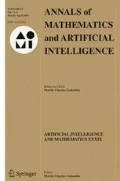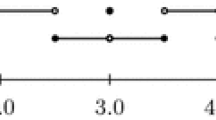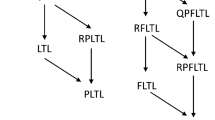Abstract
Many applications (such as system and user monitoring, runtime verification, diagnosis, observation-based decision making, intention recognition) all require to detect the occurrence of an event in a system, which entails the ability to observe the system. Observation can be costly, so it makes sense to try and reduce the number of observations, without losing full certainty about the event’s actual occurrence. In this paper, we propose a formalization of this problem. We formally show that, whenever the event to be detected follows a discrete spatial or temporal pattern, then it is possible to reduce the number of observations. We discuss exact and approximate algorithms to solve the problem, and provide an experimental evaluation of them. We apply the resulting algorithms to verification of linear temporal logics formulæ. Finally, we discuss possible generalizations and extensions, and, in particular, how event detection can benefit from logic programming techniques.
Similar content being viewed by others
References
Alberti, M., Chesani, F., Gavanelli, M., Lamma, E., Mello, P., Torroni, P.: Verifiable agent interaction in abductive logic programming: the SCIFF framework. ACM Trans. Comput. Log. (TOCL) 9(4), 1–41 (2008)
Alferes, J.J., Pereira, L.M., Swift, T.: Abduction in well-founded semantics and generalized stable models via tabled dual programs. Theory Pract. Log. Program. 4(4), 383–428 (2004)
Alon, N., Moshkovitz, D., Safra, S.: Algorithmic construction of sets for k-restrictions. ACM Trans. Algorithms 2(2), 153–177 (2006)
Anh, H.T., Pereira, L.M.: Collective intention recognition and elder care. In: Proactive Assistant Agents: Papers from the AAAI Fall Symposium (FS-10-07), pp. 26–31. AAAI (2010)
Bauer, A., Leucker, M., Schallhart, S.: Comparing LTL semantics for runtime verification. J. Log. Comput. 20, 651–674 (2010)
Bauer, A., Leucker, M., Schallhart, S.: Runtime verification for LTL and TLTL. ACM Trans. Softw. Eng. Methodol. 20(4) (2011)
Bodden, E.: A lightweight LTL runtime verification tool for Java. In: Companion to the 19th Annual ACM SIGPLAN Conference on Object-Oriented Programming, Systems, Languages, and Applications, OOPSLA 2004, Vancouver, BC, Canada, 24–28 October 2004, pp. 306–307. ACM, ACM Student Research Competition (2004)
Carlson, J., Lisper, B.: An event detection algebra for reactive systems. In: Proceedings of the 4th ACM International Conference on Embedded Software, pp. 147–154. ACM, New York, NY, USA (2004)
Costantini, S., Tocchio, A., Toni, F., Tsintza, P.: A multi-layered general agent model. In: AI*IA 2007: Artificial Intelligence and Human-Oriented Computing, 10th Congress of the Italian Association for Artificial Intelligence. LNCS, vol. 4733. Springer, Berlin (2007)
Costantini, S., Dell’Acqua, P., Pereira, L.M.: A multi-layer framework for evolving and learning agents. In: Raja, A., Cox, M.T. (eds.) Proceedings of Metareasoning: Thinking About Thinking Workshop at AAAI 2008, Chicago, USA (2008)
Costantini, S., Dell’Acqua, P., Pereira, L.M., Tsintza, P.: Runtime verification of agent properties. In: Proc. of the Int. Conf. on Applications of Declarative Programming and Knowledge Management (INAP09) (2009)
Costantini, S., Dell’Acqua, P., Pereira, L.M., Toni, F.: Learning and evolving agents in user monitoring and training. In: Atti del Congresso Nazionale AICA 2010, L’Aquila, Italy (2010). Available at http://centria.di.fct.unl.pt/~lmp/publications/slides/aica10/aica-2010.pdf
Dell’Acqua, P., Lombardi, A., Pereira, L.M.: Modelling adaptive controllers with evolving logic programs. In: Andrade-Cetto, J., Ferrier, J.-L., Pereira, J.D., Filipe, J. (eds.) ICINCO 2006, Setúbal, Portugal. INSTICC Press (2006)
Dell’Acqua, P., Pereira, L.M.: Preferential theory revision. J. Appl. Log. 5(4), 586–601(2007)
Fisher, M., Bordini, R.H., Hirsch, B., Torroni, P.: Computational logics and agents: a road map of current technologies and future trends. Comput. Intell. J. 23(1), 61–91 (2007)
Goldsby, H.J., Cheng, B.H., Zhang, J.: Amoeba-rt: run-time verification of adaptive software. In: Giese, H. (ed.) Models in Software Engineering, pp. 212–224. Springer, Berlin, Heidelberg (2008)
Guralnik, V., Srivastava, J.: Event detection from time series data. In: KDD ’99: Proceedings of the Fifth ACM SIGKDD International Conference on Knowledge Discovery and Data Mining, pp. 33–42. ACM, New York, NY, USA (1999)
Hätönen, K., Klemettinen, M., Mannila, H., Ronkainen, P., Toivonen, H.: Knowledge discovery from telecommunication network alarm databases. In: Proceedings of the Twelfth International Conference on Data Engineering, ICDE ’96, pp. 115–122. IEEE Computer Society, Washington, DC, USA (1996)
Hinze, A., Sachs, K., Buchmann, A.: Event-based applications and enabling technologies. In: DEBS ’09: Proceedings of the Third ACM International Conference on Distributed Event-Based Systems, pp. 1–15. ACM, New York, NY, USA (2009)
Iyengar, V.S.: On detecting space-time clusters. In: Proceedings of the Tenth ACM SIGKDD International Conference on Knowledge Discovery and Data Mining, KDD ’04, pp. 587–592. ACM, New York, NY, USA (2004)
Jin, Y., Dai, J., Lu, C.T.: Spatial-temporal data mining in traffic incident detection. In: In Proc. SIAM DM 2006 Workshop on Spatial Data Mining (2006)
Kakas, A.C., Kowalski, R.A., Toni, F.: Abductive logic programming. J. Log. Comput. 2(6), 719–770 (1993)
Kanno, T., Nakata, K., Furuta, K.: A method for team intention inference. Int. J. Hum.-Comput. Stud. 58(4), 393–413 (2003)
Kautz, H., Allen, J.F.: Generalized plan recognition. In: Proceedings of the Conference of the American Association of Artificial Intelligence (AAAI-86), pp. 32–38. AAAI (1986)
de Kleer, J.: Diagnosing multiple persistent and intermittent faults. In: Boutilier, C. (ed.) IJCAI 2009, Proceedings of the 21st International Joint Conference on Artificial Intelligence, Pasadena, California, USA, 11–17 July 2009, pp. 733–738 (2009)
de Kleer, J., Mackworth, A.K., Reiter, R.: Characterizing diagnoses and systems. Artif. Intell. 56(2–3), 197–222 (1992)
Leucker, M., Schallhart, S.: A brief account of runtime verification. J. Log. Algebra Program. 78(5), 293–303 (2009)
Lopes, G., Pereira, L.M.: Prospective programming with acorda. In: Empirically Successful Computerized Reasoning (ESCoR’06) Workshop at the 3rd International Joint Conference on Automated Reasoning (IJCAR’06), Seattle, USA (2006)
Mannila, H., Toivonen, H., Verkamo, A.I.: Discovery of frequent episodes in event sequences. Data Min. Knowl. Dis. 1, 259–289 (1997)
Neill, D.B., Moore, A.W., Sabhnani, M., Daniel, K.: Detection of emerging space-time clusters. In: Proceedings of the Eleventh ACM SIGKDD International Conference on Knowledge Discovery in Data Mining, KDD ’05, pp. 218–227. ACM, New York, NY, USA (2005)
Padmanabhan, B., Tuzhilin, A.: Pattern discovery in temporal databases: a temporal logic approach. In: Proceedings of the 2nd International Conference on Knowledge Discovery and Data Mining, pp. 351–354 (1996)
Pereira, F.: Extraposition grammars. Comput. Linguist. 7, 243–256 (1981)
Pereira, L.M., Anh, H.T.: Intention recognition via causal bayes networks plus plan generation. In: Lopes, L.S., Lau, N., Mariano, P., Rocha, L. (eds.) 14th Portuguese Intl. Conf. on Artificial Intelligence. LNAI, vol. 5816, pp. 138–149. Springer (2009)
Pereira, L.M., Anh, H.T.: Intention recognition with evolution prospection and causal bayesian networks. In: Madureira, A., Ferreira, J., Vale, Z. (eds.) Computational Intelligence for Engineering Systems: Emergent Applications. Intelligent Systems, Control and Automation: Science and Engineering Book Series, vol. 46, pp. 1–33. Springer (2010). Select updated papers from Intl. Symp. on Computational Intelligence for Engineering Systems. http://www.amazon.ca/Computational-Intelligence-Engineering-Systems-Applications/dp/940070092X
Pereira, L.M., Lopes, G.: Prospective logic agents. In: Neves, J.M., Santos, M.F., Machado, J.M. (eds.) Progress in Artificial Intelligence, Procs. 13th Portuguese Intl.Conf. on Artificial Intelligence (EPIA’07). LNAI, vol. 4874, pp. 73–86. Springer, Guimarães (2007)
Pereira, L.M., Ramli, C.D.P.K.: Modelling decision making with probabilistic causation. Intell. Decis. Technol. 4(2), 133–148 (2010). http://centria.di.fct.unl.pt/~lmp/publications/online-papers/IDT-Probabilistic-Causation.pdf
Pereira, L.M., Dell’Acqua, P., Lopes, G.: On preferring and inspecting abductive models. In: Gill, A, Swift, T. (eds.) Practical Aspects of Declarative Languages, 11th International Symposium, PADL 2009, Savannah, GA, USA, 19–20 January 2009. Proceedings. Lecture Notes in Computer Science, vol. 5418, pp. 1–15. Springer (2009)
Pnueli, A.: The temporal logics of programs. In: Proceedings of the 18th Symposium on the Foundations of Computer Science, pp. 46–57 (1977)
Sheu, S., Cheng, C.-Y., Chang, A.: Fast pattern detection in stream data. In: Proceedings of the 19th International Conference on Advanced Information Networking and Applications. AINA ’05, vol. 1, pp. 125–130. IEEE Computer Society, Washington, DC, USA (2005)
Slavík, P.: A tight analysis of the greedy algorithm for set cover. In: STOC ’96: Proceedings of the Twenty-Eighth Annual ACM Symposium on Theory of Computing, pp. 435–441. ACM, New York, NY, USA (1996)
Wu, M., Adeli, H.: Wavelet-neural network model for automatic traffic incident detection. Math. Comput. Appl. 6(2), 85–96 (2001)
Author information
Authors and Affiliations
Corresponding author
Rights and permissions
About this article
Cite this article
Alberti, M., Dell’Acqua, P. & Pereira, L.M. Observation strategies for event detection with incidence on runtime verification: theory, algorithms, experimentation. Ann Math Artif Intell 62, 161–186 (2011). https://doi.org/10.1007/s10472-011-9259-5
Published:
Issue Date:
DOI: https://doi.org/10.1007/s10472-011-9259-5




